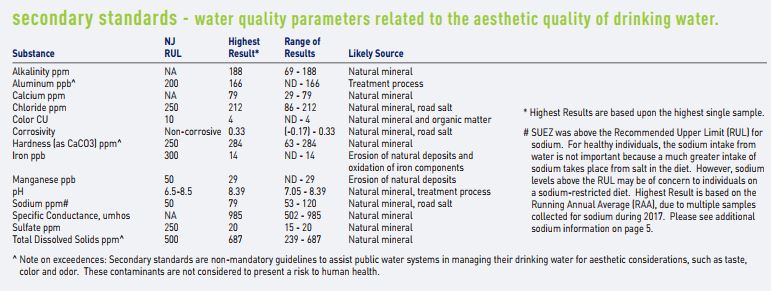gregkeller
Well-Known Member
So water is sort of the "final fronteir" for me. I've played around and messed with just about every other aspect of brewing to the point where I feel that I've got a good handle on most of the major aspects like regulating my brewing process, recipe development, yeast handling, fermentation control. I'm left with water. I have played with building a water profile from scratch after using filtered tap water for a long time. I live in NJ, so we get water from reservoirs, which means our water profile changes with the seasons. Chlorides go up in the winter when road salt gets washed into our waterways. I was wondering if someone with a good handle on water chemistry could look at the attached image from the most recent water report released and tell me if there are any red flags. Most minerals are within a range, but I'm not 100% sure if any of them are in a range where I need to worry about going all the way to RO/DI water. Obviously that gives me the most control, but it's also kind of a hassle. I brew 10 gallon batches, so making, storing, and then moving all that water (RO/DI in the basement, brew outside) is kind of a pain.
For example, my sulfates is pretty much negligable throughout the year (range is between 15-20ppm), so if I am brewing a hoppy beer and wanna up my sulfates, it's easy, but other minerals vary much more (chloride 86-212 ppm).
So I guess I'm wondering what you water gurus would do with this water? Depends on style? Beers that i've brewed with this straight filtered from the tap turn out nice, no problems, but beers I've brewed with RO built for a specific profile have that little extra something. I just wonder if I can get that extra something by amending my tap water instead of starting from scratch. Thanks and sorry for the extended question.

For example, my sulfates is pretty much negligable throughout the year (range is between 15-20ppm), so if I am brewing a hoppy beer and wanna up my sulfates, it's easy, but other minerals vary much more (chloride 86-212 ppm).
So I guess I'm wondering what you water gurus would do with this water? Depends on style? Beers that i've brewed with this straight filtered from the tap turn out nice, no problems, but beers I've brewed with RO built for a specific profile have that little extra something. I just wonder if I can get that extra something by amending my tap water instead of starting from scratch. Thanks and sorry for the extended question.



